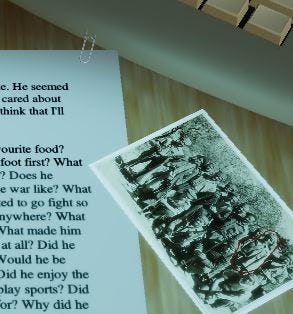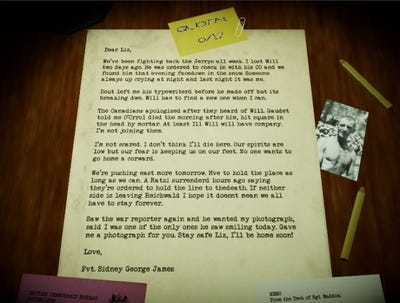Trending
Opinion: How will Project 2025 impact game developers?
The Heritage Foundation's manifesto for the possible next administration could do great harm to many, including large portions of the game development community.

Featured Blog | This community-written post highlights the best of what the game industry has to offer. Read more like it on the Game Developer Blogs or learn how to Submit Your Own Blog Post
A postmortem on a WWII historical narrative game, discussing the importance of designing around players and their expectations.

I wrote an initial postmortem on the importance of research in my historical narrative game "Who Killed My Uncle". Following that however, I received quite a bit of feedback from various sources including the wonderful Olivia Dunlap who played it on her Extra Life stream and a number of developers and players asking about some design decisions I made, so I thought it would be useful if I shared some of my thinking here.
A little background on the project: "Who Killed My Uncle" is an administration sim/historical narrative game where you play as a government censor who censors letters a young couple send to one another. It was inspired by the life of my Great Uncle who fought in the Spanish Civil war, was made by myself in just under four days during my college's fall break and distributed through itch.io for free. The core gameplay loop involved reading through letters and cross-checking their contents with a set of guidelines, editing out enough sensitive words on each letter to allow you to move on to the next one. As I'm sure you guessed, the letters tell a story.

Initially, the goal was just to develop a game. I had prototyped a simple censor mechanic which seemed to interest people at the time, so I decided to take it a bit further and apply it to a narrative.
Beyond that however, I wanted to address a struggled I've had with interactive fiction for quite some time: I don't really like them. It's strange even to me because I've always loved reading and I love writing, but something about the simple and occasionally thoughtless interactions which drive some interactive fiction that loses me.
Obviously there are exceptions to every rule, SOLACE STATE by Vivid Foundry and LOCALHOST by Aether Interactive immediately come to mind, but they also exersize unique mechanics and presentation to draw players. I wanted to challenge myself by creating something in a similar vein, presenting a narrative in a way a player like myself might enjoy or might appeal to players who don't often find appeal in more simplistic interactive fiction games. I also strove for balance as well since I didn't want these interactions to be too involved in a way which might push away those who were mostly there for the story.
In this, I think "Who Killed My Uncle" met its mark by more than I had expected it to. I noticed a number of people who didn't identify themselves as interactive fiction lovers playing it all the way through, while it also resonated with those who enjoyed narrative-heavy games.

This was a big question, possibly the biggest. I recieved it from a few different players and developers after release and it was a question I asked myself frequently during development.
I spent quite some time in the design phase thinking about how I might restrict the player's freedom to censor the page. I wanted to avoid too many distractions which could come in the form of developing complex mechanics. Some solutions I proposed involved things like limiting the player's ink supply, which felt almost too game-y and quickly broke immersion. And if my solution established a fail state...what did that mean for the player? The player started the letter over and was forced to repeat it until they succeed? That hardly sounded engaging to me.
Furthermore if I allowed the player to censor wherever they wanted then the game wouldn't retain its logic. If the player scribbled out a whole letter and sent it away, the back-and-forth dynamic of the characters sending letters in response to one another wouldn't make sense and the illusion would be ruined.
It took some time before I tried a different approach; instead I considered the fallbacks to not limiting the player at all and allowing them the freedom to draw as they like. If a player was impatient and attempted to scribble all over an entire letter it wasn't likely they were the type of player who would be willing to be invested with the story all the way through to the end anyway, so maybe it wouldn't be a loss if I didn't try to appeal to those types of players. It's like if someone bought a Rubix cube only to break it apart with a hammer and reassemble it in proper order - sure they found the solution, but only by nullifying the experience for themselves in the process.
If I wasn't concerened about potentially losing the interest of players in the process it also would allow me to draw my attention away from issues like logical consistency or branching narrative if they were to censor something they shouldn't, since I could build the narrative solely around players who were perfoming the proper solutions. Ironically, I decided the best solution to the problem of too much censoring on the player's behalf was to censor their freedom of interaction less!
Honestly, shortly after release I wasn't sure I had made the right choice. Some players told me they scribbled all over the page to progress, almost insinuating the game felt broken as a result of my inaction. It wasn't until I watched someone who meticulously censored the words out for fear of imposing too much on the characters did I realize I made a good choice, that a fair number of players were engaging with it in the way I intended.

Quite a bit, actually.
A lot of the feedback I received after release was along the lines of it being a solid concept or a little rough around the edges. I admit I was pretty defeated - I knew it was a bit buggy and its execution was a little spotty, but I was proud of it. I'm especially proud of having done in under a week!
Ultimately a lot of people hinted that while not necessarily the most stable game in the world, they wanted to see the concept expanded further. This is something that interested me as well.
I mostly enjoy making short-lived projects with a quick turn around time, but I've already laid the groundwork for a sequel to the project. It's going feature some of the same mechanics (with a twist to keep things interesting) as Who Killed My Uncle but will be built on many of the same elements as the first game. My hope is to release it as a paid product on itch.io, though I certainly need to do more research in terms of marketing and pricing before I can finalize that.
Ultimately, Who Killed My Uncle is a project I'm very proud to say I created and I'm glad players enjoyed. A lot of thinking, work and design went into the project and I hope the next one will be as strong as the first. Thanks for reading!
If you're interested in seeing where the next one goes, I update semi-frequently on my Twitter.
You May Also Like